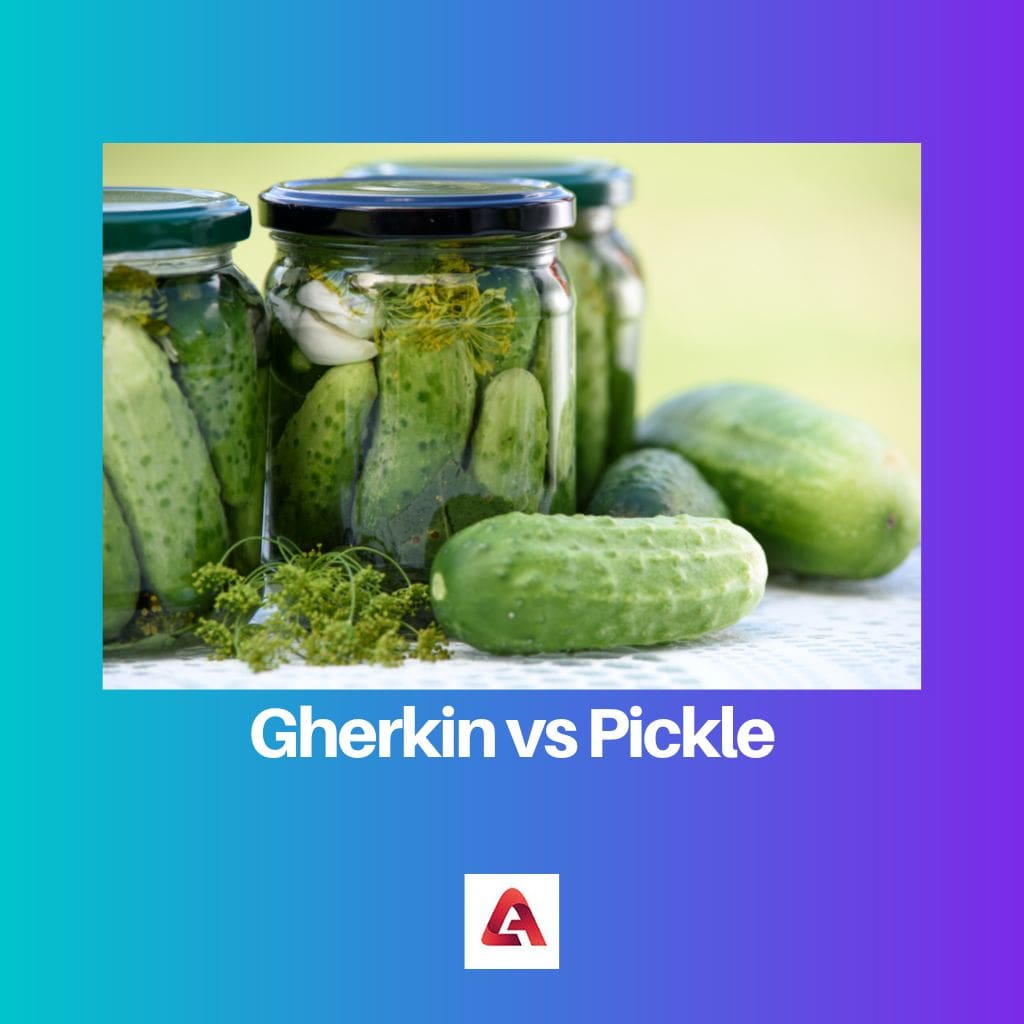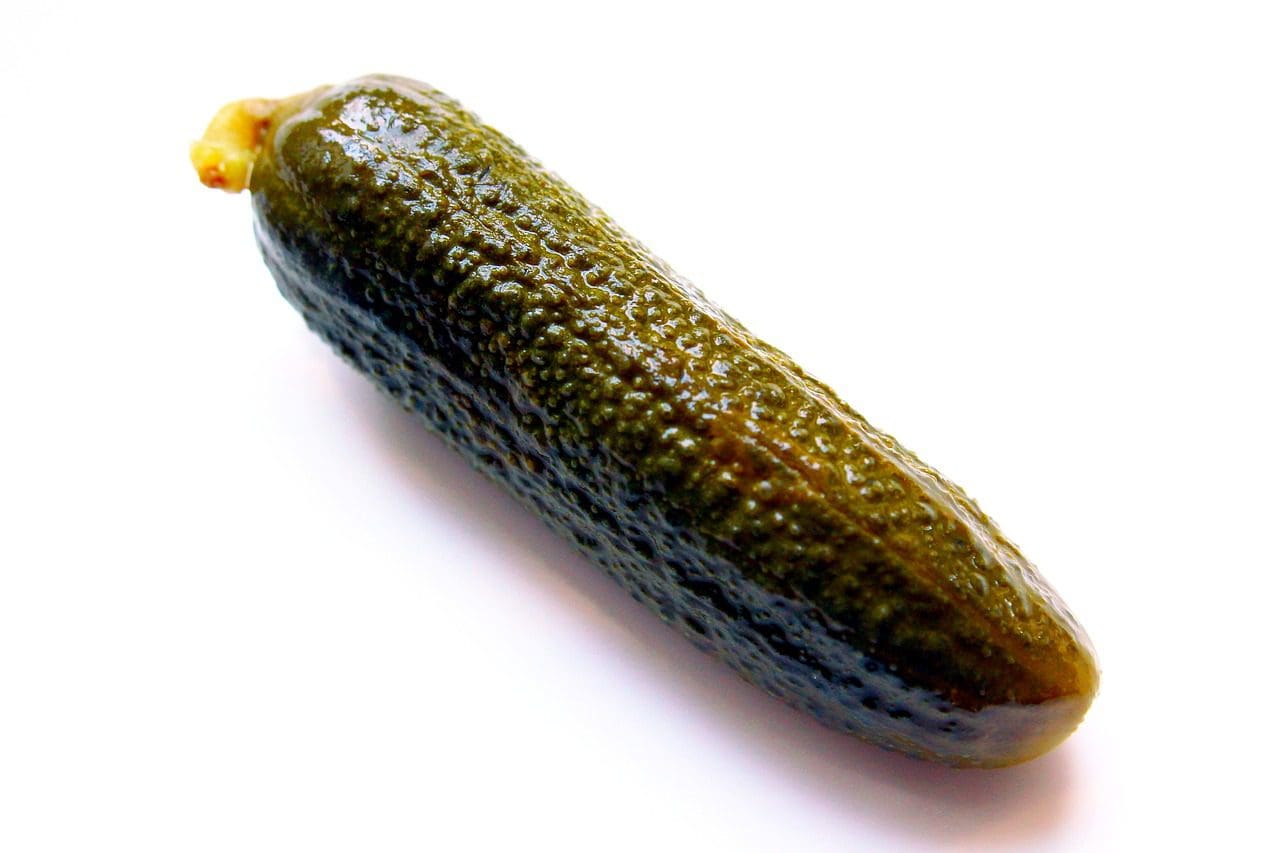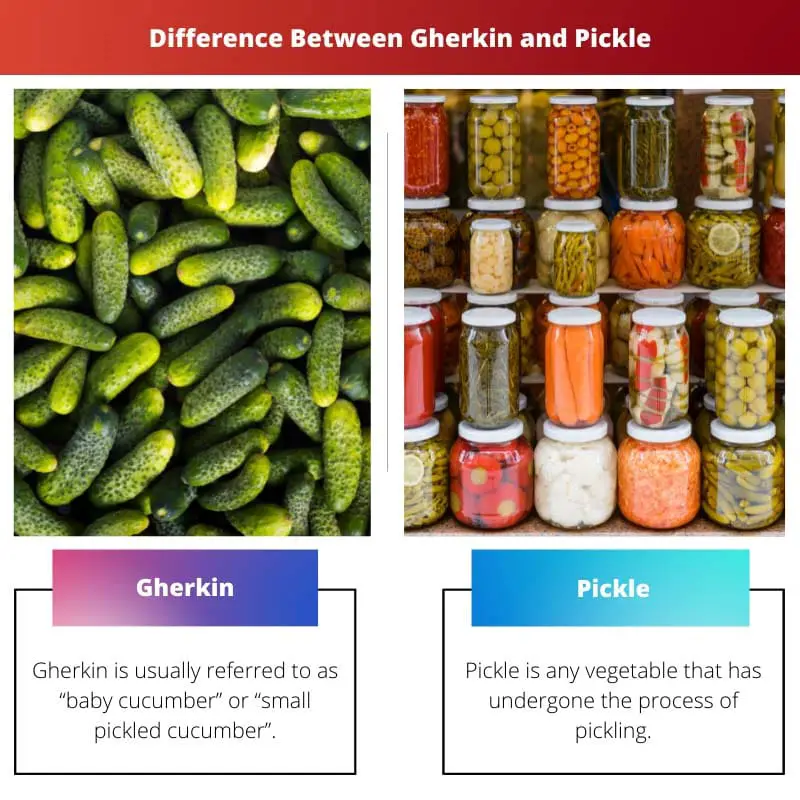Gherkin and pickles both are terms that convey very different meanings in different places. The two terms are so confusing that people cannot get a precise meaning from them.
Both gherkin and pickle are condiments and are complimented with major food dishes. They are highly preferred for their rich sour, tangy taste and high nutrient value.
Key Takeaways
- Gherkins are a specific type of small cucumber, while pickles can be made from various vegetables, including cucumbers.
- Gherkins are used for pickling due to their size and firmness, resulting in a crunchy texture.
- Both gherkins and pickles are preserved using vinegar, salt, and spices, though recipes may vary by region and personal preference.
Gherkin vs. Pickle
Gherkins are small, pickled cucumbers with a sour, tangy taste and are popular in many cuisines. Pickles are cucumbers that have been pickled in vinegar or brine with various seasonings and spices. They can be sweet, sour, spicy, or a combination of these flavors.

Gherkins are small cucumbers, one to three inches, that are pickled. They take almost 30 days to get rightfully pickled.
On the other hand, pickles can be referred to as any vegetable or meat that has undergone the pickling process. On average, the element takes four to five hours to get pickled.
Comparison Table
| Parameter of Comparison | Gherkin | Pickles |
|---|---|---|
| Definition | They pickled “baby cucumbers” | They are any vegetables or meat pickled |
| Versatility | Gherkins are a type of pickles | Pickles cannot be gherkins |
| Kind | Baby cucumbers pickled are known as gherkins | Any vegetables or meat can be pickled |
| Pickling age | It requires 30 days to get properly pickled | It can get properly pickled in 4-5 hours |
| Water content | The gherkins have a high water content | In the case of the pickles, the water content varies from vegetable to vegetable |
| State | The gherkins are smaller and crunchier | The pickles are considerably larger and soggy |
| Myth | In a few countries, gherkins are referred to as every size of cucumber | In a few countries, pickles are referred to as pickled cucumbers |
What is Gherkin?
Gherkin is called “baby cucumber” or “small pickled cucumber.” Botanically gherkin is also known as West Indian gherkin or burr gherkin, being a very close relative of cucumber but not exactly cucumber.
The scientific name for cucumber is “cucumis sativus,” while the scientific name for gherkin is “cucumis anguria.” The term gherkin comes from the Dutch work “gurken,” which means “small pickled cucumber”.
In the UK, Ireland, Australia, and South Africa, all types of cucumbers are known as gherkins regardless of the size. Gherkins are one to three inches long.
Usually, when they are 3 inches long, they are pickled in a container that contains vinegar or brine. Gherkins are more crunchy and crispy than dill pickles.
Few people prefer adding horseradish to the gherkin to increase its crispiness. Gherkins are served as a condiment dish that accompanies the main dish.
It is eaten for its tangy taste that it provides. Gherkin takes approximately 30 days to be completely prepared.
The gherkin can be made sweeter by adding sugar to the pickling liquid, brine or vinegar. But it is mostly preferred sour.
Herbs such as rosemary, tarragon, and mustard seeds are also used in the pickling agent to enhance the flavor of the gherkin even more. Gherkins are mostly preferred for eating with burgers.

What is Pickle?
A pickle is any vegetable that has undergone the process of pickling. The pickling component and liquid can vary according to choice and preference.
Pickling food can be vegetables or meat, cauliflower, carrot, onion, mango, prawn, chicken, or almost everything is pickled. Pickle is a confusing food item because, in America, Canada, and Australia, pickle is referred to as pickled cucumber.
But that is not the case when any vegetable undergoes the process of pickling. It is known as a pickle. On average, it takes up to 4-5 hours to pickle a vegetable.
The pickling food can either be pickled in a jar using pickling agents such as vinegar or brine and water and salt, or it can be pickled by lacto-fermentation. To favor the pickle, spices such as mustard, rosemary, and pepper can be added to the pickling liquid.
After pickling an item, it mostly gets soggy and loses its crunch. Pickling is one of the oldest methods of food preservation there is to date. It is mainly preferred for its delicious variety of flavors and health benefits.
Pickles are meant to complement major dishes.

Main Difference Between Gherkin and Pickle
- Gherkins are called “baby cumbers” or “small pickled cucumbers.” They are one to three inches in size, best preferred when three inches. They are a close relative of cucumbers though they are not exactly cucumbers. On the other hand, pickles are any vegetables or meat that has undergone the picking process.
- Gherkins are a pickle, as pickled baby cucumbers are known as gherkins, whereas pickles are not gherkins; they might be pickled cucumbers.
- Gherkins take an average of 30 days to get completely, whereas pickled takes four to five hours.
- Gherkins are sized one to three inches and are crunchy even after the picking process, whereas pickles are larger and get soggy after the pickling process.
- Gherkins have high water content, whereas pickles’ water content will vary based on the food being pickled.
- Gherkins in a few countries, such as the UK, Ireland, Australia, and South Africa, are called cucumbers of any size, but that is not the case. In contrast, the common myth of pickles is that it is called pickled cucumbers in a few countries, such as America, Canada, and Australia.


The explanation of what a pickle is, truly blew my mind. I had no idea it could be made from so many different foods.
As a self-proclaimed pickle expert, I find it funny how the differences between gherkins and pickles are outlined here, I’ve always known the distinction!
I respectfully disagree with the statement that pickles lose their crunch after pickling, the taste is a matter of personal taste and technique.
The dietary information provided here is very helpful, I appreciate the nutritional value of gherkins and pickles being highlighted.
I appreciate the emphasis on the health benefits offered by gherkins and pickles.
The botanical and scientific information provided is fascinating, the scientific name for the gherkin is quite a mouthful!
I think it’s quite confusing that the term ‘Gherkin’ is used to describe cucumbers of all sizes in some countries.
I find it comical that pickles can be made from a variety of vegetables and even meat, it sounds absurd!
I find it interesting how two similar food items can be so different and share the same name in various countries.
This article is very informative, I had no idea about all these differences between Gherkins and Pickles.